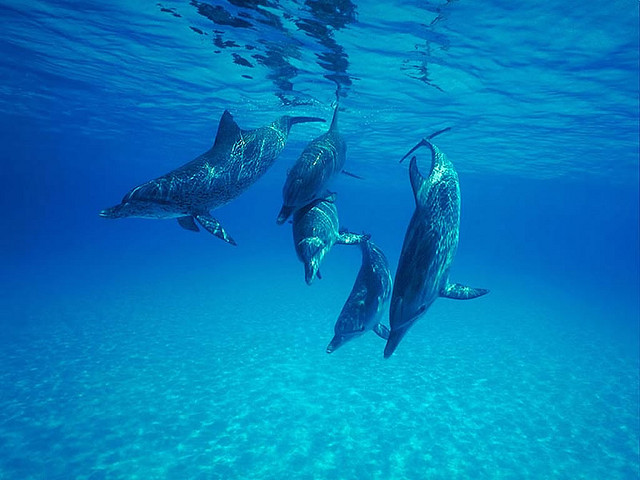This summer, off the coast of Alaska, the US Navy began an operation called Northern Edge.
The aim of Northern Edge is to practice and test new weapons in preparation for any future climate change wars over the resources that will be revealed by the shrinking ice caps in the Arctic. It’s predicted that we’ll have ice free summers over the Arctic by next year.
Unaware of the irony, it seems, they are estimating at least 180,000 takes of marine life—which is a sanitised way of saying deaths . They will be contaminating the ocean with dangerously high levels of cyanide—a component of the bomb propulsion system—not to mention all the spent casings, fuel and money.
They will also be testing new sonar weapons that are so powerful that they burst the ear drums of any nearby dolphins or whales, destroying their primary sense for communication and navigation, which often leads to death.
Putting the infuriating environmental contradictions—and the reminder that completely insane humans are in charge of bombs—aside, my question is this: would they be as cruel and thoughtless if we started calling these creatures people and if they were classified as legal persons instead of things? Could it be that this one semantic and legal difference is what keeps some of us causing huge amounts of takes and the rest of us sitting by passively?
It was Aristotle who first created a classification system that separated humans from animals and plants. For the sake of scientific classification, he separated humans from animals to distinguish human rationality from seemingly irrational animal instincts. The Greek philosophers of Aristotle’s time also came up with The Great Chain of Being: a hierarchical chain of all matter on the planet, living and non-living, with God at the top and soil at the bottom. This was then picked up by the Medieval and Renaissance thinkers and is still, although somewhat unconsciously, the way we classify the importance of our fellow Earthlings today.
However benign his intentions at the time, it seems that Aristotle gave humans a perfect excuse to exploit and abuse other forms of life without restraint.
The idea of one human as lower than another human is abhorrent. We’ve managed to mature enough to understand that, as human beings, we are all due the same rights and respect. So surely it’s time to move on from this 2000 year old idea of classification and legally recognise that all animals, birds and insects are deserving of those same rights and respect…especially nonhuman animals who are as complex as our own species such as the cetaceans, great apes and elephants.
Currently, all animals are classed as legal things. As Steve Wise, president of the Nonhuman Rights Project, points out in his Ted Talk, this makes them invisible to a court of law.
But to spend any time with beings such as chimpanzees, elephants and certain whales and dolphins dissolves any ideas that these creatures are simply expendable things. These are beings with complex cultures and relationships, with intelligence and understanding, who show compassion and an ability to love.
A legal person has rights given to them for just existing. Not only does this extend to all humans (in theory anyway), it is also extended to inanimate objects and ideas such as corporations, books and buildings. When Mc Donald’s is seen as a legal person, why on earth are we not extending this legal right to beings who share 97.8% of our DNA or who have lifelong relationships with their mums like Orca whale do?
The Nonhuman Rights Project, a US based organisation, is currently engaged in a court case to gain legal personhood for chimpanzees held in captivity in the state of New York. Although this is groundbreaking within an English speaking country’s court, it is not the first of its kind. In Argentina, a judge set a precedent by recognising an orangutan called Sandra as a nonhuman person rather than a thing and freeing her from a zoo. The Indian government has also declared the need to reclassify whales and dolphins as nonhuman persons and banned all entertainment involving these highly sentient beings.
It seems that, slowly, we are beginning to evolve our idea of what it means to be a person, not only in the legal sense but also in the moral sense. When you add the suffix people to any creature and call them the dolphin people or the ant people, they instantly shoot up the Chain of Being to sit side by side with the rest of us human people—where they belong.
Relephant:
What Would Animals Say if They Could Talk?
Author: Suzanne Williams
Apprentice Editor: Lois Person / Editor: Renée Picard
Photo: Jay Ebberly/Flickr







Read 4 comments and reply